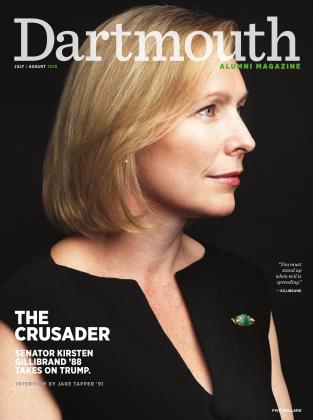Burning with Intrigue
JAKE TAPPER ’91
WITH HIS FIRST NOVEL, CNN ANCHOR TAPPER LEAPS BACK IN TIME and into a Washington, D.C., swamp of corruption and double-dealing. The protagonist of The Hellfire Club is Congressman Charlie Marder, an idealistic WW II veteran who goes to D.C. and loses his moral compass. Questionable compromises, sinister conspiracies, and violence ensue.
“The political system is rotten,” Tapper tells DAM. “It requires corruption and obsequiousness in a way that wears down good people and wears down their principles.”
The novel takes its name from the real-life Hellfire Club, a clique of 18th-century British aristocrats who engaged in secret orgiastic revels. “The elite would engage in the most debauched activities and also forge alliances that had an impact on English society,” says Tapper. “Finding out that Ben Franklin attended at least one of those bacchanals planted a
seed in my head: What if that continued? What if there were secret societies like that today? I can’t imagine that there aren’t.”
A history major at Dartmouth, Tapper set his story in 1954 at the height of McCarthyism. He depicts his characters interacting with Sen. Joe McCarthy, his henchman Roy Cohn, Senate Democratic Leader Lyndon B. Johnson, and the Kennedy brothers. The Hellfire Club is filled with unlikely but accurate details such as McCarthy’s habit of eating a stick of butter to blunt the effects of alcohol. Dartmouth gets a shout-out in a reference to the 1953 Commencement address by President Eisenhower. The author of three nonfiction books (2012’s The Outpost, on the war in Afghanistan, is being made into a movie), Tapper has achieved celebrity for his aggressive interviewing style. “This was even more fun,” he says, “because it was a rollicking adventure, and I could really go to extremes and push the boundaries.”
Tapper sees parallels between the 1950s and our own era. “Obviously, McCarthyism and Trumpism are very different. But the idea of smearing people and lying about people and having no regard for the truth—that is something that they have in common,” he says. “Something else that they have in common is an entire political and media world unsure of how to react.”
You can read an excerpt at our website.
Julia M. Klein
 View Full Issue
View Full Issue
More From This Issue
-
 The DAM Interview
The DAM InterviewKirsten Gillibrand ’88
July | August 2018 By Jake Tapper ’91 -
 Books
BooksThe Book That Changed My Life
July | August 2018 By GEORGE M. SPENCER -

The King Of Broadway
July | August 2018 By Jennifer Wulff ’96 -
 Personal History
Personal HistoryThe Evolved Eater
July | August 2018 By NICK TARANTO ’06 -
 YOUR TURN
YOUR TURNYOUR TURN
July | August 2018 -
 Campus
CampusA New VP for Alumni Relations
July | August 2018 By ABIGAIL DRACHMAN-JONES ’03
Julia M. Klein
-
 Cover Story
Cover StoryThe Unlikely Governor
NOVEMBER | DECEMBER 2015 By JULIA M. KLEIN -
 THE DAM INTERVIEW
THE DAM INTERVIEWState of the Union
SEPTEMBER | OCTOBER 2016 By JULIA M. KLEIN -
 Books
BooksPop Fiction
MARCH|APRIL 2019 By JULIA M. KLEIN -
 PURSUITS
PURSUITSFamily Friction
MAY | JUNE 2022 By Julia M. Klein -
 PURSUITS
PURSUITSJEAN HANFF KORELITZ ’83 Plot Boiler
SEPTEMBER | OCTOBER 2024 By Julia M. Klein
Pursuits
-
 Pursuits
PursuitsNew Books By Alumni
NOVEMBER | DECEMBER 2016 -
 PURSUITS
PURSUITSOn the Bar
JANUARY | FEBRUARY 2020 By Caroline Cook '21 -
 pursuits
pursuitsHigh Times
JULY | AUGUST 2018 By Ishaan H. Jajodia ’20 -
 Voices in the Wilderness
Voices in the WildernessKeta Burke-WIlliams ’15
SEPTEMBER | OCTOBER 2021 By Lisa Kocian '94 -
 PURSUITS
PURSUITSPARKE MACDOWELL '07 Building Bridges
JANUARY | FEBRUARY 2023 By Nancy Schoeffler -
 pursuits
pursuitsSay No to the Status Quo
JANUARY | FEBRUARY 2018 By Theresa D’Orsi

